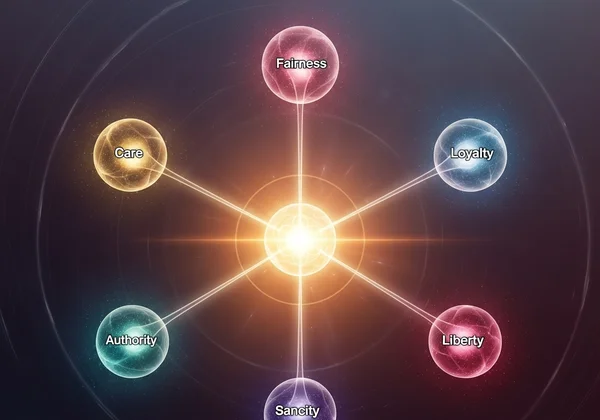Moral Test: Identify & Live Your Core Moral Values
July 21, 2025 | By Julian Croft
Discovering your moral compass is a foundational journey of self-awareness and personal growth. It’s about understanding the internal principles that guide your actions, shape your decisions, and ultimately define your character. But in a world full of noise and conflicting demands, how do I identify my values? This guide is designed to help you answer that question. We will explore what moral values are, provide practical steps to identify your own unique set, and show you how a moral test can illuminate your path to living with greater integrity and purpose.
This journey is not about finding "right" or "wrong" answers, but about uncovering what is authentically true for you. By understanding your core values, you can make choices that align with your deepest self, leading to a more fulfilling and principled life. Ready to begin your exploration? You can explore your moral compass with a structured assessment designed to offer profound insights.

Understanding & Identifying Your Core Moral Values
Before you can live by your values, you must first understand what they are and why they are so crucial. This process of values clarification is the first step toward building a life of integrity. It involves looking inward to distinguish between societal expectations and your genuine personal beliefs.
What Are Values, Morals, and Ethics?
While often used interchangeably, these terms have distinct meanings. Values are the personal beliefs and ideals that are important to you; they are what you deem good, desirable, or significant. Morals are the principles concerning the distinction between right and wrong behavior, often shaped by your values. Ethics, on the other hand, are external standards of conduct provided by social systems, like professions or religions. Understanding these differences is key to clear moral reasoning.
Why Finding Your Core Values Matters for Life's Decisions
Your core values act as your personal navigation system. When you face a difficult choice, your values provide the framework to make a decision that feels right and authentic. Living in alignment with your values reduces internal conflict, boosts confidence, and creates a powerful sense of purpose. Conversely, when your actions conflict with your values, it can lead to stress, dissatisfaction, and a feeling of being adrift. This is why ethical self-discovery is not just a philosophical exercise; it's a practical tool for well-being.
Practical Exercises to Identify Your Values Effectively
Identifying your core values requires honest self-reflection. Here are a few exercises to get you started:
-
Reflect on Peak Moments: Think about times in your life when you felt happiest or most proud. What were you doing? Who were you with? What values were you honoring in those moments (e.g., creativity, connection, achievement)?
-
Identify Admired Qualities: Consider the people you admire most. What specific qualities do you respect in them? Their integrity, compassion, or courage? These often reflect values you hold.
-
Consider Your Discomfort: Think about what truly upsets or frustrates you in the world or in the actions of others. Injustice? Dishonesty? Cruelty? Your strongest emotional reactions often point directly to your most deeply held values.

Exploring Common Moral Foundations & Principles
While your values are unique to you, psychology suggests that human morality is built upon a set of common foundations. Understanding these universal themes can help you better categorize and comprehend your own ethical inclinations. Many people ask, "What are the 5 moral values?" The answer is complex, but rooted in well-researched psychological theories.
The Big Five or Six: Universal Moral Values Explained
Drawing from Moral Foundations Theory, many psychologists point to six key foundations that underpin moral systems across different cultures:
- Care/Harm: This foundation drives our ability to feel and dislike the pain of others. It underlies virtues like kindness and compassion.
- Fairness/Cheating: This relates to concepts of justice, rights, and equality. It triggers feelings of anger or protest when someone is treated unfairly.
- Loyalty/Betrayal: This pertains to our sense of obligation to our in-groups, like family, community, or nation.
- Authority/Subversion: This foundation is about respect for tradition, legitimate leaders, and social order.
- Sanctity/Degradation: This relates to the idea that some things are sacred and pure, inspiring a sense of awe or disgust.
- Liberty/Oppression: This focuses on the feelings of resentment we have toward those who dominate or restrict our freedom.
A moral foundations test can help you see which of these pillars are most central to your own moral framework.

Four Basic Moral Principles Guiding Ethical Behavior
Beyond these foundations, ethicists often refer to four core principles used to navigate complex dilemmas, particularly in fields like medicine and research:
- Autonomy: Respecting an individual's right to make their own choices.
- Beneficence: The obligation to act for the benefit of others.
- Non-maleficence: The duty to "do no harm."
- Justice: The commitment to fairness in the distribution of resources and treatment.
Is Empathy a Core Value? Understanding its Role
This is a common question. While empathy is crucial for moral behavior, it's better described as a capacity or skill rather than a value itself. Empathy is the ability to understand and share the feelings of another. It's the engine that powers values like compassion, kindness, and care. Without empathy, it would be difficult to act on these values in a meaningful way.
Living by Your Values for Ethical Self-Discovery & Growth
Identifying your values is a powerful first step, but the real transformation comes from integrating them into your daily life. This is where you move from knowing your principles to embodying them. To truly live by your values means making conscious choices—big and small—that reflect your ethical core.
Bridging Values and Actions: Daily Application
To make your values tangible, connect them to specific behaviors. If you value "Community," you might join a local volunteer group. If you value "Learning," you could dedicate 30 minutes each day to reading a non-fiction book. Write down your top three values and list three actions you can take this week to honor each one. This practice makes your principles an active part of your life, not just abstract ideas.
Navigating Conflicts and Upholding Your Ethical Core
You will inevitably face situations where your values conflict with each other (e.g., Loyalty to a friend vs. Honesty about their mistake) or with external pressures. Having a clearly defined ethical core helps you navigate these moments with integrity. It gives you the strength to choose the path that is most aligned with who you want to be, even when it's difficult. This is the essence of building moral character.
How a Moral Test Can Clarify Your Ethical Compass
Self-reflection is essential, but sometimes an objective tool can provide clarity you can't achieve alone. A comprehensive moral assessment test is designed to do just that. By presenting you with nuanced scenarios, it bypasses your conscious biases to reveal your underlying decision-making patterns. An ethical compass test like the one on our platform provides a detailed analysis of your moral tendencies, helping you validate the values you've identified and uncover ones you may not have been aware of.

Your Journey to an Aligned Life: Take the Next Step
Embracing your core moral values is an ongoing journey of clarity and authenticity. You've gained key insights and frameworks; now, it's time to apply them for deeper, personalized understanding.
The next step is to put this knowledge into practice and gain deeper, personalized insights. By engaging with a structured tool, you can receive a clear snapshot of your unique ethical profile. Are you ready to find your ethical core? Take our free moral test today and receive a personalized report to guide your journey toward a more principled and authentic life.
Frequently Asked Questions About Moral Values & Self-Discovery
What is a moral test, and how does it help identify values?
A moral test is a psychological tool that presents you with a series of ethical dilemmas or thought-provoking scenarios. By analyzing your responses, it helps reveal your underlying moral priorities and decision-making styles. It offers an objective lens to see which values, like fairness or loyalty, you prioritize when faced with a complex choice.
How can I figure out my morals and values effectively?
An effective approach combines introspection with objective feedback. Start with self-reflection exercises like journaling about peak experiences and identifying admired qualities in others. To deepen this understanding, use a scientifically designed moral values test to get a comprehensive report on your ethical leanings.
Are there universal "best" moral values?
While there are common moral foundations found across cultures, such as care and fairness, there is no universally agreed-upon "best" set of values. The goal of ethical self-discovery is not to adopt a perfect set of values but to identify and live in alignment with the values that are most authentic to you, promoting personal integrity and a consistent moral compass.
What is a basic moral test, and how does it differ from a comprehensive one?
A basic moral test might be a short, informal quiz that gives you a general idea of your alignment, like a D&D moral alignment test. A comprehensive assessment, like the free moral test on our platform, is developed by experts and uses complex scenarios and AI-driven analysis to provide a detailed, nuanced report with actionable insights for personal growth.